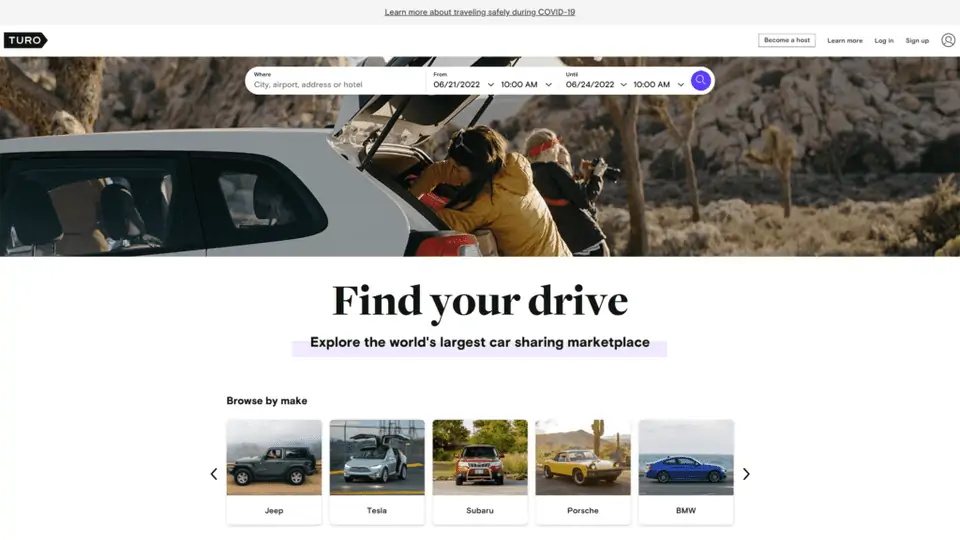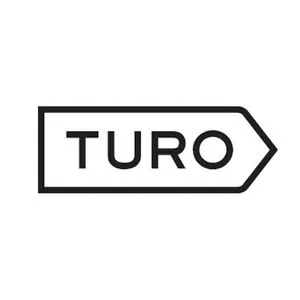Key Takeaways
- Eligibility Requirements: To rent your car on Turo, you need to be over 21, have a valid driver’s license, and ensure your car meets Turo’s standards.
- Listing Your Car: Create a listing with details and photos of your car, set a competitive rental rate, and specify rental rules and availability.
- Offering Add-Ons: Boost your rental appeal by offering additional services like delivery, child seats, or GPS navigation.
- Building a Fleet: Increase earnings by expanding your car offerings, focusing on popular and high-demand vehicles, and providing exceptional service.
What is Turo?
Turo is a peer-to-peer car-sharing company. It was created as a smart solution to the hassle of car rentals, mainly by cutting out the middleman.

As a car owner, you can rent your vehicle directly to Turo guests and earn extra money with little to no effort.
As a Turo guest, you can choose from the app’s diverse car selection and book one with only a touch of a button.
The Turo app is safe, easy to use, and relatively cheaper than traditional car rental. It’s no surprise that it has been on a roll ever since its release.
Statistically speaking, in 2022, the app was recorded to have 2.9 million active guests and 160,000 active hosts in the countries where it operates.
You’ll find the app available in the U.S., UK, Australia, France, and several Canadian provinces.
How Much Can You Make Using Turo?
You can expect to make $500 to $1,000 per month, with this range increasing to $7,000 or more if you expand your fleet. But, there are no promises here, as several variables will influence your profits.
Your location, for example, can make all the difference in your booking frequency. In general, hosts who live near popular tourist destinations and airports win the jackpot.
Your vehicle type and class will also affect your earnings. Certain car models are renowned on the Turo scene for being the ones that are most frequently rented. The Toyota Corolla, Ford Mustang, Toyota Prius, Camry, and Jeep Wrangler are a few of them.
The good news is that you don’t need psychic powers to predict how much money you’ll make using this platform. All you have to do is enter your vehicle and booking information into their Turo calculator, and it’ll show you an estimation of your profits.
Preliminaries: How Turo Works for Hosts [Car Owners]
If generating income by renting out your car sounds tempting, let us show you how Turo works for hosts. We’ll walk you through the key aspects you should be aware of as you get started.
Step 1: Meet the Eligibility Requirements
The app has a set of criteria for the vehicles that can be listed, so your first stop is checking whether or not your car qualifies.
Here’s a sneak peek at Turo’s major eligibility requirements in the U.S.:
- Automobiles shouldn’t be older than 12 years. If yours is, you can check if it qualifies for Turo’s “specialty” category, which accepts cars older than 25 years under certain conditions.
- Certain vehicles aren’t permitted, such as motorcycles, RVs, limousines, and box trucks.
- Vehicles previously stated as total losses won’t be accepted.
- Cars should have a mileage of less than 130,000 miles. If your car exceeds that but you’ve continued keeping it in pristine condition, it’ll remain listed.
- You must have car insurance that meets Turo’s requirements, plus one of Turo’s protection plans (more on that below).
Step 2: Create an Account on Turo
Head to Turo and tap “Become a Host.” You can sign up using your email, Facebook, Google, or Apple account.
Expect to provide and verify your identity, personal information, and details of your car, provide pictures, and agree to the platform’s terms of service and privacy policy.
Step 3: List Your Car
Next, you have to create a listing for your car on the Turo app or website and ensure you provide high-quality photos, an adequate description of your vehicle’s model, year, features, and condition, as well as the rules you expect your potential customers to abide by.
This is your opportunity to stand out among other Turo hosts.
The platform is highly competitive and filled with thousands of new listings weekly, so the basic rule of providing excellent service at affordable prices to beat the competition applies here too.
Here are a few tips:
- Make sure your car is in high demand; some cars are more popular on Turo than others
- Choose a competitive daily rental rate
- Offer add-ons. Unlimited mileage, deliveries, and pickups are fan favorites, as well as prepaid fueling
If you’re a small business, focus on building a loyal customer base and a strong reputation. Excellent customer service, quick responses, and timely pickups and deliveries are among your keys to success.
However, once you scale your business and acquire a large fleet of vehicles, you can diversify your offering and cater to different segments of the market by introducing luxury vehicles, economy cars, and specialty vehicles.
Step 4: Choose a Protection Plan
After making sure that your car checks all the boxes, your next task is to learn the nitty-gritty details of Turo’s protection plans. This is because you must choose one of them, and your choice will greatly affect your earnings.
Each plan represents a percentage that’ll be deducted from the cost of each trip you accept. In exchange, Turo will reimburse you specified amounts if your car is damaged during a guest ride.
In the U.S., you’ll have five protection plans to choose from. All five plans offer $750,000 in third-party liability insurance, with few exceptions.
You should also note that the deductible amount and reimbursement types will vary depending on how much of your earnings you choose to keep.
A deductible amount is the sum of money that you, as a host, will be responsible for paying before Turo’s coverage kicks in.
Now, let’s make sense of it all by looking at the table below, which contains all the key information about Turo’s plans:
| Protection Plans | 60 Plan | 75 Plan | 80 Plan | 85 Plan | 90 Plan |
|---|---|---|---|---|---|
| % of Earnings per Trip | 60% | 75% | 80% | 85% | 90% |
| Deductible per Physical Damage Incident | $0 | $250 | $750 | $1,625 | $2,500 |
| Exterior Wear and Tear | Reimbursed by Turo | N/A | N/A | N/A | N/A |
| Replacement Vehicle Reimbursement (Compensation while the car is being repaired) | $50/day for a maximum of 10 days. The full $500 will be reimbursed in case of total loss. | $30/day for a maximum of 10 days. The full $300 will be reimbursed in case of total loss. | N/A | N/A | N/A |
Brett’s Take: Thoughts From an Expert
ALWAYS check with your insurance provider to understand how your policy works in conjunction with Turo’s coverage. Some personal auto insurance policies may not cover incidents that occur during rental periods.
If you get this incorrect, and an incident occurs, you could potentially be opening yourself up to huge amount of liability.
Step 5: Receive Bookings
Once your listing is live, you’ll start receiving bookings. You can either manually approve or decline each trip request, or use “Book Instantly” to automatically accept them.
Communicate with your guests, agree on the check-in and check-out process, remind them of your rules, and point out any other important information before you rent your car for the first time.
Don’t forget to perform regular maintenance on the car to keep it neat for future customers.
More importantly, inspect and document its condition before and after each trip, and forward any damage claims or issues to Turo!
Step 6: Dropping Off the Car to Guests
Hosts can set up specific preferred pick-up and drop-off locations in their car’s listing, including offering it for delivery directly to the renter or for pick-up from an airport.
On the first day of the rental, the host drops the car off at the agreed location and either leaves it there to be picked up remotely or meets with the renter to deliver the keys.
Step 7: Picking Up the Car From Guests
At the end of the rental, the host returns to the pick-up location and gets the car back from the renter. This is the same transaction as the drop-off, just in reverse, and can again be either in-person or remote.
Hosts receive payment after the rental period is over.
Step 6: Start Earning
You’ll get paid via direct deposit within three days after each trip ends. You can track your earnings and payouts on your “Host Hub.”
The amount you earn depends on many factors, including your car’s availability, model, and rental period.
After every trip, you’ll need to rate and review your guests, and they’re expected to do the same for you.
This affects your reputation and visibility on the platform, which will consequently influence how much you can earn.
Plan of Action: Making Money on Turo
Let’s delve into the strategies that allow you to earn more money with Turo.
1. Know How to List Your Car
Turo claims that the average annual income of one car is $10,516, but the average host will make $500–$1,000 a month since many factors come into play, chiefly reputation and car model.
We recommend using the Turo Calculator to estimate your earnings.
Here’s what you need to pay attention to:
- Some cars are in greater demand than others. Popular choices include the Toyota Corolla, Ford Mustang, Toyota Prius, Mercedes-Benz C-Class, and BMW 3 Series.
- Different types of cars go for different rental rates. The average price of a standard car is $55 a day. SUVs range around $90, classics around $120, and luxury cars around $210.
- Inflated rates gather cobwebs, whereas competitive rates attract customers. There are too many cars on Turo, so offer budget-friendly rates to make your car stand out. Still, make sure they cover your car payment and other expenses.
- Your reputation precedes you. Focus on providing excellent service; word of mouth will take care of the rest.
2. Offer Add-Ons and Deliveries
Be generous with your offerings; every little bit helps establish your presence on the platform.
Offering delivery and pickup services for a fee is a good place to start. They can help renters who don’t have convenient transport to the location of your car waste less time and avoid frustration.
You can also go the extra mile by providing a child safety seat, prepaid fuel, ski racks, or a portable GPS device in your car.
Anything you think would be a neat feature to have in a car would likely impress your guest too!
Brett’s Take: Thoughts From an Expert
If possible, use remote access tools to facilitate key exchanges. This can make the rental process more convenient for both you and the renter.
As somebody who rents from Turo while traveling, I can speak to the helpfulness of this type of rental.
I have rented from Turo many different times, and I have yet to actually meet a Turo host. This is because when I rent, I go for ease of use, where the vehicle is immediately available when I need it.
If I were to have to coordinate a rental with another person’s schedule, it would remove some of the magic of using Turo. It’s a frictionless experience, and I like to keep it that way.
3. Capitalize on Weekends
People plan getaways and adventures during the weekends; it’s an excellent period to adjust your pricing and earn extra income.
Raising your rental rate from Friday to Sunday is a good place to start, but you can also offer special weekend packages or discounts for longer rentals to entice guests.
Here are a few examples:
- Offer a discount to guests who book their car for the entire weekend
- Offer a special rate for guests who book their car during a certain season
- Offer discounts to guests who refer their friends or family
4. Build a Fleet
If the average annual income for a single car on Turo is $10,516, it’s $94,642 for nine cars.
Scaling your business and building a fleet containing multiple cars should be a part of your plan if you’re serious about making money on the platform.
But this is no easy feat; you need to carefully execute your business growth plan to ensure profitability.
Turo has a business planner that can help you estimate your earnings, but here are a few extra tips you may find useful:
- Analyze the market and your target demand. Focus on figuring out which cars are in high demand, what prices are competitive, and the strategies your competitors use
- Introduce an expensive car to your fleet and see how well it fares. Double down if it works
- Provide excellent customer service. Respond quickly, offer deliveries and add-ons, and keep your car spotless and mechanically sound
- Use social media, email marketing, and collaborations to stand out
- Manage your finances well. Make sure your rental income covers all your rental-related expenses. Ideally, it should cover at least 150% of your total monthly expenses per car
Extra Suggestions
Provide cleaning services to keep your car neat between rentals. If possible, partner with a roadside assistance company to help your guests have extra peace of mind.
Also make sure to document the condition of the vehicle.
Before each rental, take detailed photos of your vehicle’s interior and exterior to document its condition. This will be crucial for any damage claims should they arise.
However, be prepared for normal wear and tear on your vehicle. Renting out your car means it will experience more usage, which can lead to increased maintenance needs.
And if you can, try to become an All-Star Host!
The Pros and Cons of Turo for Hosts
Just like running any other business, being a host on Turo has a pretty and not-so-pretty side to it. We’re about to reveal both, so you know what to expect.
Upsides of Turo Hosting
While there are numerous advantages to listing your vehicle on this platform, three, in particular, stand out:
1. Minimal Initial Investment
Nothing sounds more appealing than starting a profitable gig without having to spend a lot of money. When you use your own car on Turo, you’ll pay little to no upfront expenses, depending on the condition of your vehicle, extra amenities you want to add, etc.
Of course, this won’t exactly be the case if you buy a car specifically to use on Turo. For this reason, we always recommend testing the waters with your own vehicle before making any significant investments.
2. Easy Ticket to Earning Passive Income
Hosting on Turo is the way to go if you want to monetize your car but don’t have the time or energy to get into ridesharing.
That’s because Turo hosts don’t have many responsibilities, especially those operating on a small scale. Keep your car in good condition, and when it’s booked, drop it off at an agreed-upon location and pick it up when the guest completes the ride.
In return, you get to generate passive income while sitting at home or doing your regular job.
3. Full Control Over Account Management
Turo will give you full command of your account. This means you have the freedom to customize your rental car schedule with no obligations whatsoever. You’ll also have the flexibility to expand your fleet and share more vehicles if you’d like.
You’ll have the opportunity to directly communicate with customers. That way, you’ll get the opportunity to provide them with a positive experience, which is helpful for getting that 5-star rating.
Downsides of Turo Hosting
We’re sure you had some scary thoughts as we were discussing the idea of leaving your car with strangers, so allow us to show you the real major risks of getting into this business:
1. Usage Damage and Accidents
Rental vehicles may develop signs of damage because of frequent use, or only a single instance of misuse. This can be a nightmare for hosts sharing their personal car. The fact that Turo doesn’t cover interior wear and tear makes it even more inconvenient.
Besides, there’ll always be the possibility of your car getting involved in an accident. We can’t say many Turo hosts have had this experience, but those who have weren’t pleased.
2. Challenging Customers
You’ll encounter a diverse range of guests on Turo; some will be an absolute treat to deal with, while others won’t.
There have been multiple incidents where guests disregard the host’s instructions, like smoking in the car when they shouldn’t. Other guests have even been reported to delay the vehicle drop-off for days.
Just make sure to contact Turo roadside assistance if you find yourself in a similar situation so they can take necessary action.
3. Risks Associated With Larger Fleets
The more cars you list, the greater will your liabilities be. Trying to juggle different bookings while communicating with various customers isn’t exactly a walk in the park. This can consume a lot of your time and energy.
Add to that the higher financial risk, especially if you’re financing these vehicles. There’ll come a time when bookings will be scarce, and loans will stare you down. Without proper planning, this can financially drain you.
Frequently Asked Questions
What Happens if My Turo Guest Doesn’t Show Up?
You must follow Turo’s regulations for reporting no-show guests so you become eligible to receive a portion of your earnings. If you don’t, you’ll lose your entire estimated profit for this ride.
What Are the All-Star and Power Hosts on Turo?
Turo’s All-Star and Power Host categories include the app’s most highly-rated car owners. Both categories are nearly identical. The main difference is that you must have at least four vehicles listed to become a Power host.
Achieving any of these titles will give you access to several benefits, including increased listing visibility.
Can Turo Hosts Track Their Vehicles?
Yes, as a Turo host, you’re allowed to install tracking devices in your vehicle. However, you must follow the platform’s constraints set in this regard, such as informing your guests of the tracking device.
Wrapping Up
If you own a vehicle and want to increase your revenue streams, Turo is your answer.
The app’s user-friendly interface and helpful customer support will make it easy for you to kickstart your journey as a host. And the money you’ll get from your Turo bookings will certainly make it easier for you to keep going!






